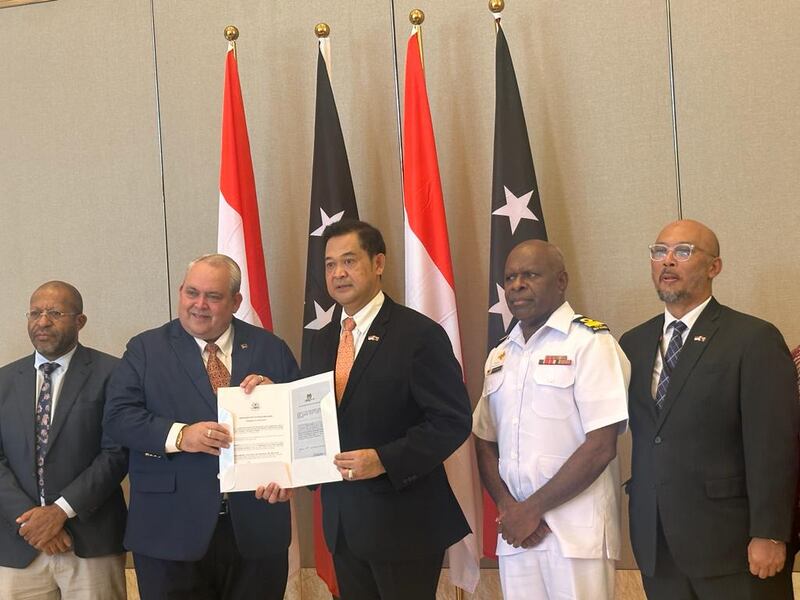Indonesia and Papua New Guinea will boost defense cooperation, officials from the two countries said Tuesday, including border patrols in a region where indigenous Papuans have waged a decades-long insurgency against Indonesian rule.
Papua New Guinea’s Foreign Minister Justin Tkatchenko and Indonesia’s ambassador to the Pacific island country, Andriana Supandy, held a press conference in Port Moresby to announce ratification of a defense cooperation agreement that had languished since being signed a decade ago.
“Joint border patrols and different types of defense cooperation between Indonesia and Papua New Guinea of course will be part of the evergrowing security mechanism,” Tkatchenko told reporters.
“It will be great to see now and into the future, Indonesia and PNG forces working closely together, side by side, on our borders, within our country, within their country, sharing knowledge, training, [and] many other things as well,” he said.
Indonesia and Papua New Guinea have a 760-kilometer (472-mile) border that slices through the middle of the island of New Guinea, north of Australia. The line on the map is a product of the colonial era, which split the Melanesian island into Dutch, German and British rule, and arbitrarily divided indigenous peoples traditionally organized around extended kinship.
“Indonesia hopes the agreement will ensure a peaceful, stable Pacific region and will strengthen our relationship with PNG,” said Supandy.
Tkatchenko, asked if Papua New Guinea could be drawn into supporting Indonesian military operations against Papuan independence fighters, said the government respects Indonesia’s sovereignty and doesn’t interfere in internal Indonesian matters.

Home to some 270 million people, Indonesia is a rising Southeast Asian power that reaches into the South Pacific region and dwarfs Papua New Guinea in population, economic size and military might. Papuans in Indonesia’s easternmost provinces have fought Indonesian rule since it took control of the region from the Dutch in the 1960s.
Papua New Guinea, the most populous Pacific island country with an estimated 12 million people, has aspired for decades to modernize and expand its small and cash-strapped defense force.
It signed a defense pact with the United States last year that is part of the U.S. response to China's inroads with Pacific island nations, but which could also benefit Papua New Guinea's forces through cooperation with a sophisticated military that it is the world's largest.
In December, Papua New Guinea signed a security agreement with Australia that included assistance to increase police numbers and aims to help the Pacific country improve its tenuous grasp on law and order. At least 49 people were killed in tribal violence in Enga province earlier this month, which followed riots and looting in the capital Port Moresby in January.
Tkatchenko said defense cooperation with Indonesia is especially important because of the need to upgrade Papua New Guinea’s capacity to control the border.
“So we have more security when people immigrate and travel over an open border – how do we address that, how do we fix that, how do we monitor it, how do we secure it and so on? There’s a lot of work to do,” he said.
Indonesia’s President Joko Widodo, during a state visit to Papua New Guinea last year, promised to take steps to boost border trade that has been stifled for decades by Indonesia’s conflict with independence fighters in its Papuan provinces.
